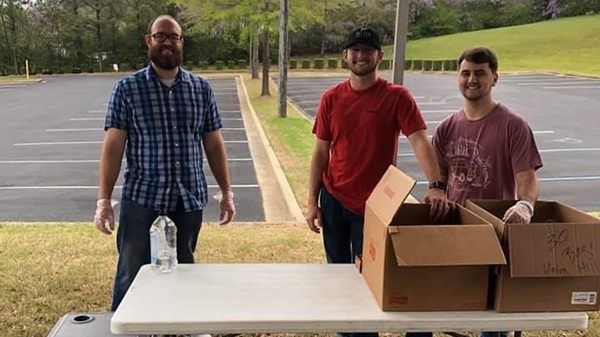Matthew Reams said that for him and his wife, Dani, it was just a reflex to help feed the county’s children when the schools there closed for COVID-19. The couple had opened their restaurant, Triple R Café, in 2017 as a ministry.
Before they opened it, they “had been praying about a way to get closer to the community God had called us to serve,” said Reams, pastor of Sardis Baptist Church, Rockford.
And when the coronavirus crisis hit, Triple R Café pared down to one goal — keep all the kids in Coosa County fed.
“Our first thought was, ‘These kids are used to eating every day; we’ve got to do something,’” Reams said.
So partnering with Ed’s on Main in Goodwater and a nonprofit organization called Empowered to Conquer, Triple R Café shut down its regular operations and started serving hot lunches for children.
Churches stepping in
“We just want to be the hands and feet of Jesus,” Reams said.
He’s not the only one. Churches all over the state — even those whose pastors don’t run restaurants — have been stepping in to help fill the gap left when their local school cafeterias closed because of COVID-19 concerns.
Before the crisis, one in four children in Alabama struggled with hunger, according to Feeding America. That’s only increased as hunger in general across the state has risen. Food-related calls to 211 — the state’s hotline for health and human services — jumped from 423 in March 2019 to 2,545 in March of this year, according to al.com.
June Barrett, coordinator of child nutrition for the Alabama State Department of Education, said churches who are interested in becoming a food distribution site can start by visiting the state’s summer food program website, breakforaplate.com. There, they can search by location to see what organizations in their area are coordinating feeding efforts, and then reach out to them to learn how to become a distribution site.
Some area schools may still be distributing meals too, and if that’s the case, you can contact the school directly, she said.
If there are no sponsors in your area, Barrett recommends reaching out to Ben Guthrie at bguthrie@alsde.edu to find out how best to help where you are.
“There’s no cookie-cutter way to help — it’s different in every area,” Barrett said. “But if a church wants to help and gets trained, anyone can help.”
That opportunity doesn’t end with the COVID-19 crisis either, she said. There’s a need for distribution sites every summer.
“To the churches wanting to help feed the children and be involved in the child nutrition program, thank you,” Barrett said. “Whenever those needs arise, people need to know where they can come and feel safe to be cared for, from a meal standpoint.”
David Hobson, director of missions for Mud Creek Baptist Association, said helping the Jefferson County Board of Education distribute meals in their area has provided a “great opportunity to show our community that they are loved and that one thing they can be sure of in a very unsure time is that the churches in their community love and support them.”
Four churches in the association — Union Hill Baptist, Rock Creek; Dogwood Grove Baptist, Adger; Smithville Baptist, Oak Grove; and Pine Ridge Baptist, Bessemer — came together to distribute nearly 1,000 meals in recent days.
Mike Stevens, pastor of Union Hill Baptist, said it was a blessing to see the churches come together to help feed children. He’s “thankful for the heart” of the county’s employees to “go above and beyond to love on” the families in the community.
“We will get through this season by the grace of Jesus Christ, and I’m confident the Lord is using these times to draw people to salvation,” Stevens said.
Lydia Sebert, site director for Dogwood Grove Baptist, said church members there “were so thankful to be given a purpose and opportunity to serve in such difficult and unprecedented times.”
The program allowed the church to reach out, meet people in the community and form relationships that otherwise wouldn’t have been formed, she said.
‘Security in chaos’
“This feeding program gave our community and church members more than just food. It gave everyone a sense of security in the midst of chaos, a place to feel safe and a constant in their disrupted lives,” Sebert said. “We were so thankful for the opportunity to act as the hands and feet of Jesus.”






Share with others: